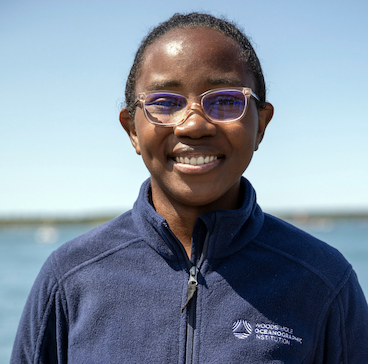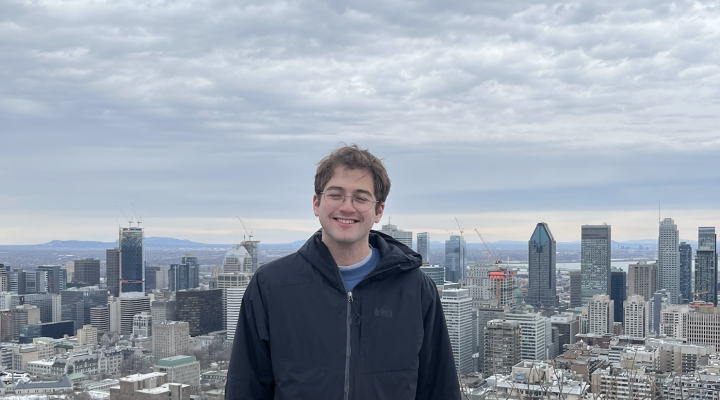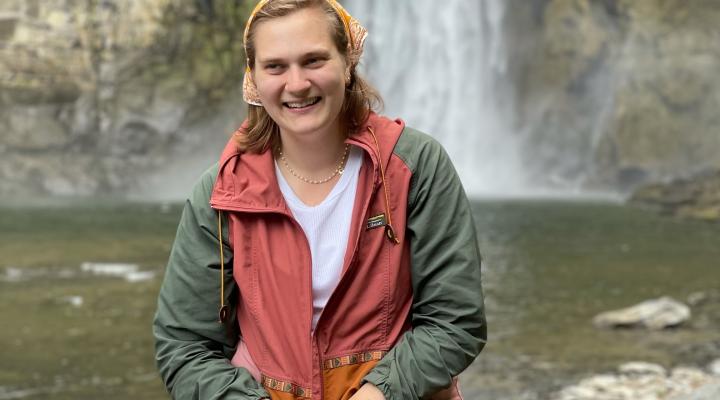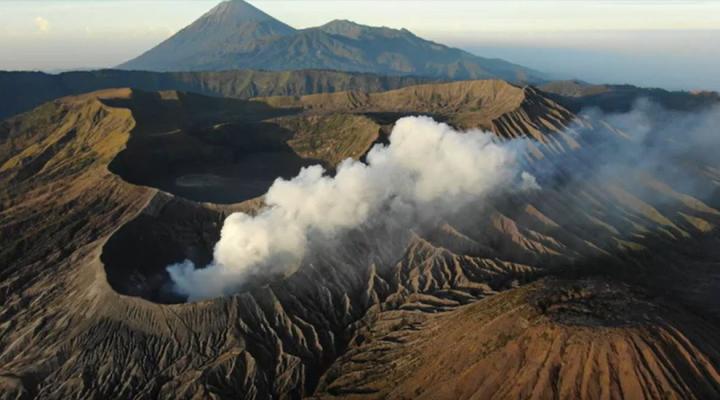The Department of Earth and Atmospheric Sciences is rare. While most of the Schools and Departments at Cornell draw their students from just one college, undergraduates from three different colleges--Arts and Sciences, Agriculture and Life Sciences, and Engineering--can major in Earth and Atmospheric Sciences. The number of undergraduates choosing to major in EAS has grown steadily over the past few years and there are many reasons why.
A common thread connecting all our students is the wish to learn more about the Earth and how it works—often with the goal of making it better in some way.
You can see why three of our current students representing three different colleges have chosen EAS. Maybe their reasons resonate with you?
Victoria Abunaw
Hometown: Boston, MA (or thereabouts)
Major: Earth and Atmospheric Sciences
College: College of Agriculture and Life Sciences
Expected year of graduation: 2024
 Why did you decide to major in EAS? I became an EAS major because it offered a concentration in ocean science—and given my appreciation for the planet and the ocean, I figured this to be a solid opportunity to combine my prior interests with my academics; and with the burgeoning requirement for earth scientists and informed citizens with the effects of climate change, I felt more compelled than ever to make this decision.
Why did you decide to major in EAS? I became an EAS major because it offered a concentration in ocean science—and given my appreciation for the planet and the ocean, I figured this to be a solid opportunity to combine my prior interests with my academics; and with the burgeoning requirement for earth scientists and informed citizens with the effects of climate change, I felt more compelled than ever to make this decision.
What has been a class you have loved, and why? I've liked all of my classes, but I think the one that stands out most to me was Ocean Satellite Remote Sensing. Not only did it help me realize that programming and data science were also important aspects of the Earth sciences, but it also informed me on my greatest source of enthusiasm to this day.
What do you hope to do after you leave Cornell? I am hoping to pursue a doctoral degree and become an oceanographer!
William Hooker
Hometown: Ridgefield, CT
Major: Earth and Atmospheric Sciences
Minor: Biological Sciences; Marine Biology
College: College of Arts and Sciences
Expected year of graduation: 2024
 Why did you decide to major in EAS? As an aspiring paleontologist, I chose to major in Earth and Atmospheric Sciences (and concentrate in Geological Science) to study Earth systems and understand how these systems shape, and are shaped by, the diversity of life, both past and present. To compliment my major, I chose to minor in Biological Sciences and Marine Biology. By focusing on Earth systems processes and evolutionary biology classes, I created my own paleontology curriculum, as paleontology is the intersection of the fields of geology and biology.
Why did you decide to major in EAS? As an aspiring paleontologist, I chose to major in Earth and Atmospheric Sciences (and concentrate in Geological Science) to study Earth systems and understand how these systems shape, and are shaped by, the diversity of life, both past and present. To compliment my major, I chose to minor in Biological Sciences and Marine Biology. By focusing on Earth systems processes and evolutionary biology classes, I created my own paleontology curriculum, as paleontology is the intersection of the fields of geology and biology.
What has been a class you have loved, and why? Paleobiology, of course! Not only did I learn a lot, but this class also taught me fundamental field geology skills and enabled my first independent research project. These opportunities have been critical in shaping my development as an early career scientist.
What do you hope to do after you leave Cornell? I hope to attend graduate school and pursue a Ph.D. in vertebrate paleontology.
Ashley Yang
Hometown: Syracuse, NY
Major: Earth and Atmospheric Sciences with a concentration in Climate Sciences.
College: College of Engineering
Expected year of Graduation: 2024
 Why did you decide to major in EAS? I decided to major in EAS and concentrate in Climate Sciences because I feel a responsibility to address climate change. I lived in New York City when Hurricane Sandy hit. I was raised to take environmentally-friendly actions, but this event made me understand the importance of mitigating climate change. Seeing the disparities in how Sandy affected higher-income and underserved communities also caused me to ponder how climate change will continue to cause harm to marginalized groups.
Why did you decide to major in EAS? I decided to major in EAS and concentrate in Climate Sciences because I feel a responsibility to address climate change. I lived in New York City when Hurricane Sandy hit. I was raised to take environmentally-friendly actions, but this event made me understand the importance of mitigating climate change. Seeing the disparities in how Sandy affected higher-income and underserved communities also caused me to ponder how climate change will continue to cause harm to marginalized groups.
What has been a class you have loved, and why? One class that I have really enjoyed at Cornell is Oceanography with Dr. Bruce Monger. The professor’s passion for the planet and scientific advancements is contagious, and I found the class engaging and applicable to other aspects of my education.
What do you hope to do after you leave Cornell? After leaving Cornell, I hope to work towards making our society more environmentally sustainable.




 Why did you decide to major in EAS? I became an EAS major because it offered a concentration in ocean science—and given my appreciation for the planet and the ocean, I figured this to be a solid opportunity to combine my prior interests with my academics; and with the burgeoning requirement for earth scientists and informed citizens with the effects of climate change, I felt more compelled than ever to make this decision.
Why did you decide to major in EAS? I became an EAS major because it offered a concentration in ocean science—and given my appreciation for the planet and the ocean, I figured this to be a solid opportunity to combine my prior interests with my academics; and with the burgeoning requirement for earth scientists and informed citizens with the effects of climate change, I felt more compelled than ever to make this decision. Why did you decide to major in EAS? As an aspiring paleontologist, I chose to major in Earth and Atmospheric Sciences (and concentrate in Geological Science) to study Earth systems and understand how these systems shape, and are shaped by, the diversity of life, both past and present. To compliment my major, I chose to minor in Biological Sciences and Marine Biology. By focusing on Earth systems processes and evolutionary biology classes, I created my own paleontology curriculum, as paleontology is the intersection of the fields of geology and biology.
Why did you decide to major in EAS? As an aspiring paleontologist, I chose to major in Earth and Atmospheric Sciences (and concentrate in Geological Science) to study Earth systems and understand how these systems shape, and are shaped by, the diversity of life, both past and present. To compliment my major, I chose to minor in Biological Sciences and Marine Biology. By focusing on Earth systems processes and evolutionary biology classes, I created my own paleontology curriculum, as paleontology is the intersection of the fields of geology and biology. Why did you decide to major in EAS? I decided to major in EAS and concentrate in Climate Sciences because I feel a responsibility to address climate change. I lived in New York City when Hurricane Sandy hit. I was raised to take environmentally-friendly actions, but this event made me understand the importance of mitigating climate change. Seeing the disparities in how Sandy affected higher-income and underserved communities also caused me to ponder how climate change will continue to cause harm to marginalized groups.
Why did you decide to major in EAS? I decided to major in EAS and concentrate in Climate Sciences because I feel a responsibility to address climate change. I lived in New York City when Hurricane Sandy hit. I was raised to take environmentally-friendly actions, but this event made me understand the importance of mitigating climate change. Seeing the disparities in how Sandy affected higher-income and underserved communities also caused me to ponder how climate change will continue to cause harm to marginalized groups.
